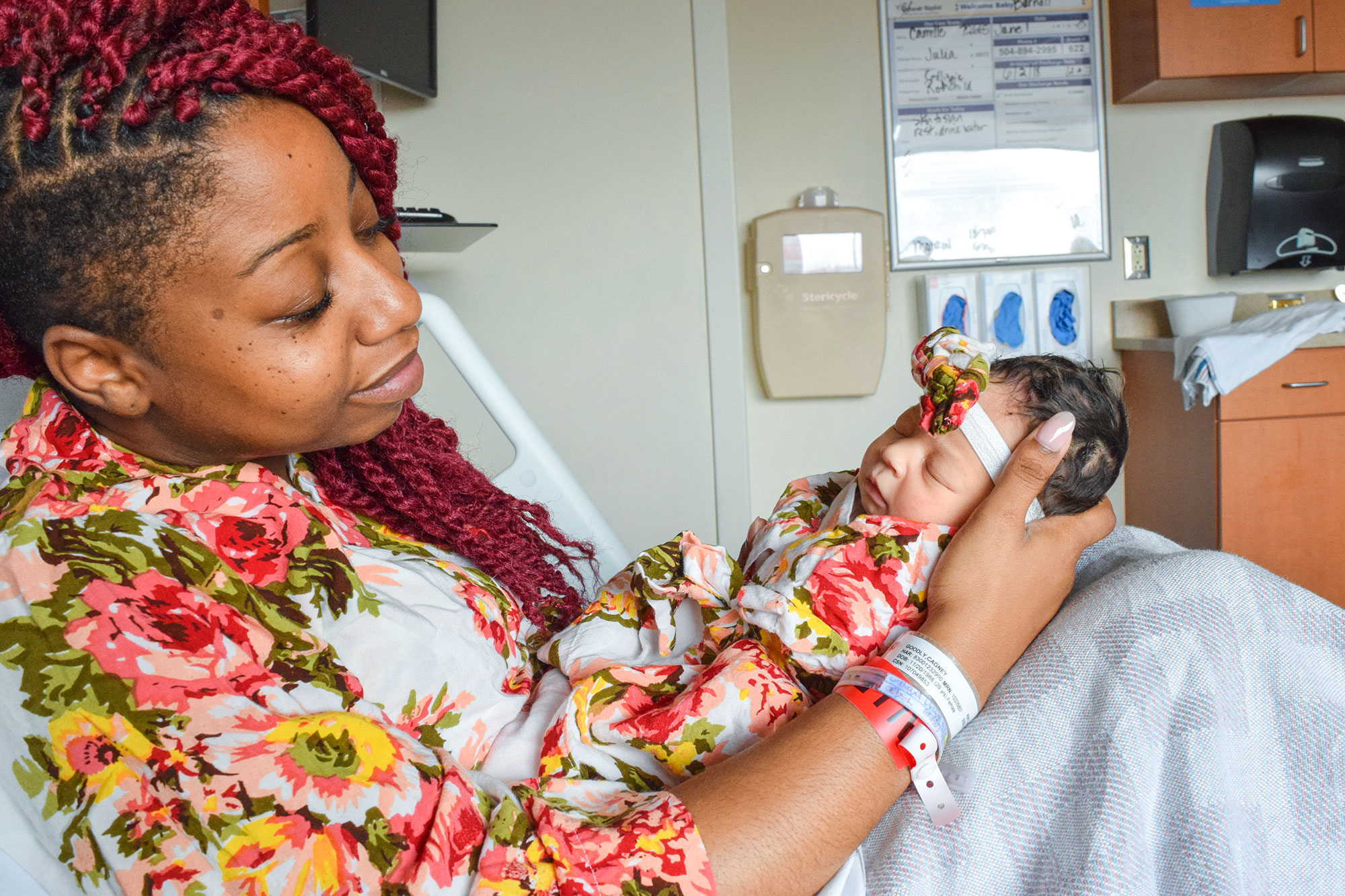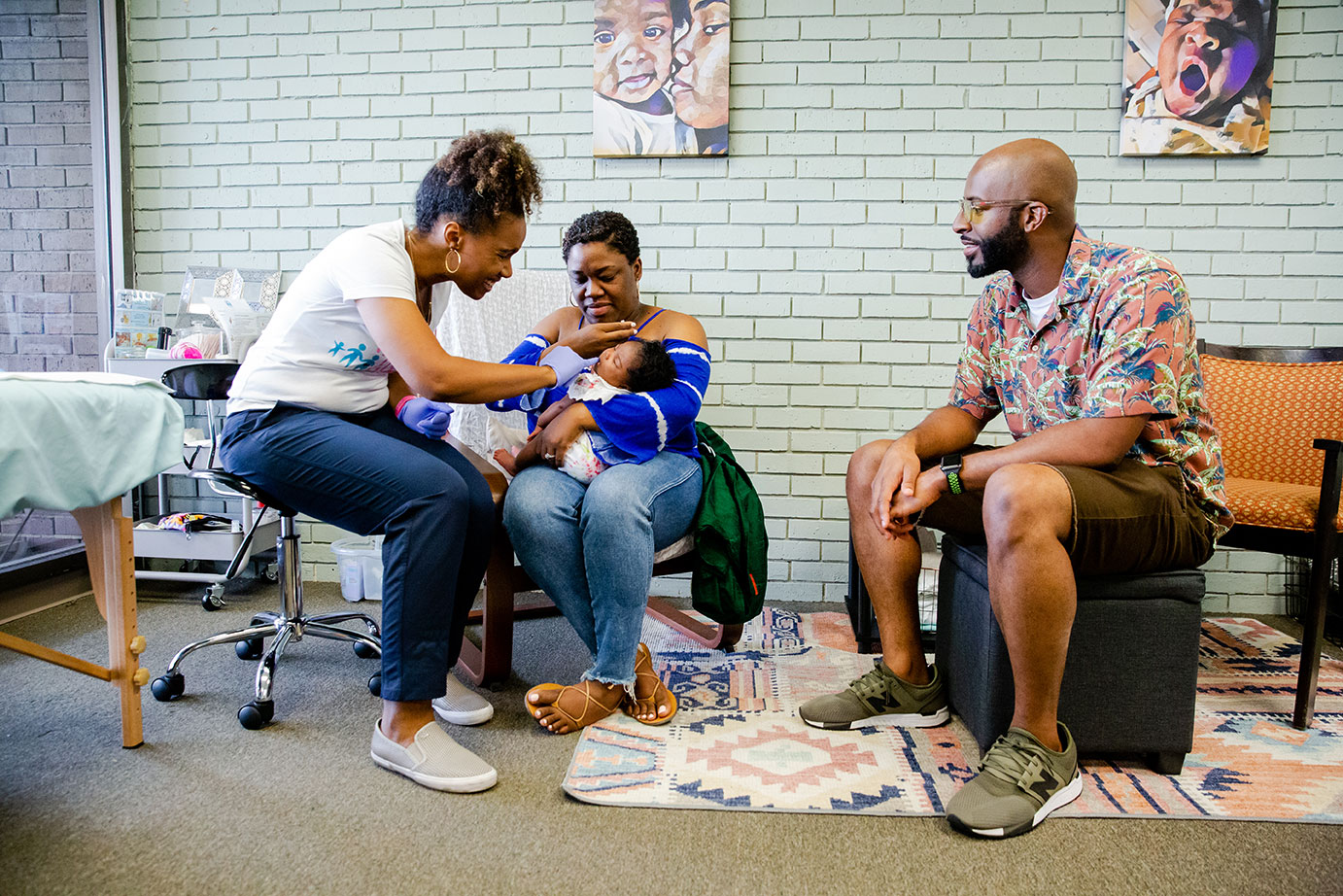Laboring in the lobby due to overcrowding, inattentive nurses during an induced labor, and being drug tested without consent are some of the disparities Black women experienced in New Orleans when delivering.
D
uring Demetrice Smith’s second pregnancy experience, she unknowingly was drug tested by her colleagues. “…I was laboring and delivering at the hospital where I actually was a nurse,” said Demetrice, a Certified Nurse Practitioner (CNP) Midwife, Louisiana Pregnancy-Associated Mortality Review member, and President of the Louisiana Black Midwives Alliance. When Demetrice was in labor her obstetrician and gynecologist, a Black woman, was out on maternity leave and later asked if she was aware that she was tested for illicit drugs. Furthermore, due to overcrowding, Demetrice’s labor began in the hospital’s lobby where she remained until a room was cleaned and vacant.
Fifty-eight years after Malcolm X preached the words, “The most disrespected person in America is the Black woman,” Black moms continue to experience disrespect, neglect, and lack of protection with impunity by medical staff at hospitals. This isn’t just a national issue, Black mamas in our backyard, New Orleans, are dying from being ignored by medical staff during childbirth and postpartum.
The Disparities
According to the Louisiana Pregnancy-Associated Mortality Review’s 2017 report, 80% of pregnancy-related deaths were considered potentially preventable. “Domestic violence, substance abuse, preeclampsia, and postpartum hemorrhage” are the leading causes of maternal mortality in Louisiana, says Demetrice. “It’s mostly Black and Brown mamas,”.
Cagney Goodly, a political consultant and a chief strategist who is currently pursuing a Master’s in Public Health Management, reflects on her immediate postpartum experience in an emergency room. “You can tell when something’s wrong and [when] you feel like you’re dying and I very much felt that. there was just a lot of fluid on me to where they couldn’t get a catheter in me,” says Cagney “I was so swollen, I thought my stitches were gonna burst and my blood pressure just kept going up.”
After delivering her daughter, she expressed to [nurses], “my ankles are jiggly, my toes are really fat, and I can’t even wear rings on my fingers, and 24 hours ago that wasn’t the case.” They responded, “it’s normal; it’s probably fluid retention; you did have an epidural.” A doubtful Cagney was discharged and went home. Three days later she was at an emergency room with a stroke level blood pressure and swollen feet after feeling dizzy while breastfeeding her baby.
“…I just remember telling Rashida, ‘I can’t lose my baby, like I just got her,’ said Cagney who was fearful of the fate of her own life. Dr. Rashida Govan, an expert on trauma-informed care, healing justice, and disparities Black women endure on a regular basis and in childbirth, assured Cagney ‘I am not going to let them let you go.’ Govan then addressed the medical staff for telling Cagney it was normal symptoms when she in fact had signs of postpartum preeclampsia and that she would have had a stroke had they arrived at the emergency room fifteen minutes later. Govan is also the Godmother of Cagney’s daughter and the executive director at two organizations, the New Orleans Youth Alliance (NOYA) and Project Butterfly.

Cagney Goodly holds her newborn daughter.
Photo courtesy of the Goodly family.
Even with expertise on policy issues surrounding racial health disparities, being insured, and intentionally having a Black woman OBGYN, Cagney was still ignored by nurses, and it cost her her independence, mental health, and mobility for a year postpartum. “And to think that it could have been avoided had someone just paid attention to me,” said Cagney. She endured an intense, labor, as the epidural didn’t take. Cagney’s mother noticed that nurses weren’t being attentive, going as long as three hours without checking on the exhausted, laboring mom. She says , “my next time I will have… a doula available because I think that can be the difference between life and death.”
Grow Dat Crew Leader and NOYA Youth Leadership Fellowship Alumna, Jonshell Jonson was newly independent and working a double shift, serving a large crowd of customers at Wendy’s on St. Charles during Mardi Gras season, when she passed out and was hospitalized. It was then she learned she was pregnant. While she had intended to continue working double shifts throughout her pregnancy to save money for baby expenses, an early hyperemesis gravidarum diagnosis led her to quit her job, move back home with family, and spend most of her pregnancy on bedrest.
For the first six months of her pregnancy, her body rejected water and food, she rapidly lost weight, and experienced dizzy spells and dehydration frequently. Each time she was hospitalized for these severe symptoms, Jonshell says staff at St. Bernard Parish Hospital in the 9th ward downplayed her hyperemesis gravidarum symptoms.“Their priority [felt like] you need to leave here with enough fluids in your body [so] that we did our job” It wasn’t until she switched providers and hospitals late in her pregnancy that she says she received more attentive treatment from medical staff, but immediately after delivering she was diagnosed with preeclampsia.
How does Health Insurance and Socioeconomic Background play a role?
The average cost to give birth in Louisiana at a hospital is $16,272 without insurance. This doesn’t include the cost of c-section delivery, add-ons, such as an epidural, nor other complications. This also doesn’t include midwife nor doulas services.
While type of insurance plays a factor in the type of care moms will receive and where they will deliver, two of the moms who experienced the above disparities were privately insured and worked in the medical industry or were well versed with policy surrounding the health disparities. Their awareness, expertise, and work background couldn’t save them from these traumatic birthing experiences.
“Not being able to see a doctor is scary,” says Jonshell, who about three months after delivering in 2018, was unexpectedly cut off from Medicaid. The breastfeeding mama could no longer afford to attend postpartum checkups, including lactation consulting. Being that she was the first woman in her family to breastfeed, she couldn’t seek advice from anyone about her breastfeeding concerns, such as her breasts potentially getting clogged. “…I was confused on how all of that worked because I’ve always received Medicaid my entire life…And I don’t remember getting mail about it.”. It wasn’t until 2020 that Jonshell received health insurance coverage again. “I watch so closely what kind of coverage I have now…not being able to go to the doctor is just not an option,” says Johnson with regards to her current pregnancy.
What Solutions Are Needed to Improve Maternal Care for Black Mamas?
Providers need to complete ongoing trauma-informed care and implicit bias training, as there are still many assumptions adopted by providers about Black women.
“Research especially for Louisiana is showing women are dying 24 hours to 42 days after birth. If we wait until we do that six week check up, half of the moms would be dead,” says Demetrice Smith, as she expresses what led her organization to create its upcoming pilot program.
Moms take their babies to pediatric appointments two to three days after birth, much sooner than their own six-week check-up appointments. Within this program, medical assistants at three partnering pediatric offices will take moms’ blood pressure. If it’s high, then they will be recommended to go to the ER or their provider immediately. Sometimes moms can be asymptomatic — no swelling, vision changes, nausea, abdominal pain, pain in between shoulder blades — thus checking their blood pressure could be life saving because high blood pressure is an indicator of preeclampsia and symptoms are typically present two days after delivery.
In comparison to birthing at a hospital, a home birth with a certified professional midwife (CPM) is roughly $5,000 in Louisiana. “We also have to be mindful that there are two different types of midwives. There’s Certified Professional Midwives (CPMs) and Certified Nurse Practitioners (CNMs). So CPMs in Louisiana do not practice in hospitals and CNMs only practice in hospitals, so there’s a little bit of difference in the [work] culture…in Louisiana, if you’re a nurse, you cannot do a home birth,” says Ashley Hill Hamilton, the Director of Advocacy and Outreach at Birthmark Doulas Collective. CPMs can only do home births and their services aren’t covered by insurance in Louisiana, whereas services by CNMs in hospitals are offered coverage depending on type of insurance.
Hamilton’s organization, The Birthmark Doulas Collective, is preparing for its May 2021 The Black Birth Matters Conference to improve maternal outcomes for Black women. Ticket sales will be used to offer free doula services to local low-income, Black families.

Nurse Nikki, NP and partner of Birthmark Doulas, with new born family for postnatal check.
Photo courtesy of Birthmark Doulas
Doulas listen for moms’ cries. Doctors listen for babies’ cries. Doulas serve as a support system for moms and advocate on their behalf. “Because Black women are experiencing the most inequity… [and] are not being respected as the experts of their bodies… [A doula will] encourage you to ask questions, to answer questions where they can… making sure people are not existing in the silences while things are happening to them, especially in medical settings,” says Hamilton.
“Providers spend about ten minutes with moms during visits, whereas midwives spend thirty minutes to an hour, which helps build trust between midwives and moms,” says Smith, which provides more attention to their well-being. Additionally, midwives provide a holistic approach during birth and postpartum check ups. They inform moms about available options so they can be empowered to make their own decisions, and educate families throughout the entire pregnancy and postpartum experience.
Jonshell says she is now experiencing better care at Ochsner Baptist in her current pregnancy. She says, “since I stuck with Oschner, I’ve been able to take a vitamin that helps with nausea..and two different nausea pills that I alternate through that help me to eat food…The medicine helps a lot for my independence. I’m able to eat and get enough energy to go to work…”
However COVID-19 complicates things for Jonshell. “ I’m not as free to go to the doctor because of the capacity, especially when I had to go to the emergency room…in December,” she says. “People have all of these other symptoms for other reasons [not related to COVID], but I just would be scared…if I start running a fever, [and] it weren’t due to COVID, that I would be turned away.”
Due to the pandemic, a birthing mother may have to make the difficult choice between having their doula or their spouse present during their hospital visit. It’s imperative that Black women’s emotional support isn’t compromised during the pandemic. Considering that resources are stretched and restrictions are in place at hospitals given the circumstances surrounding COVID, it’s possible that there will be a demand for home births. Thus, doulas and midwives are needed now more than ever to meet the demand and provide greater care physically and emotionally to Black moms.




0 Comments